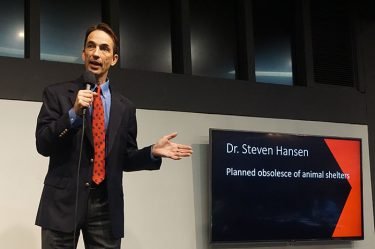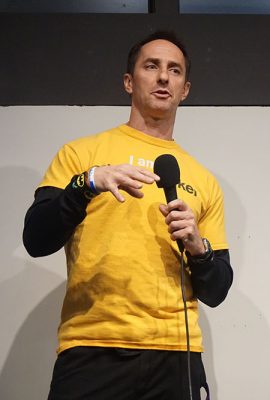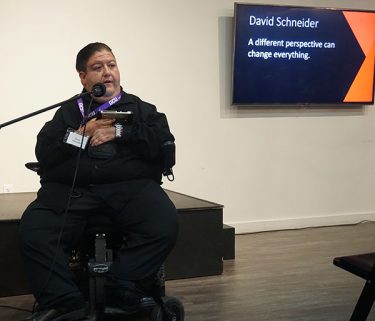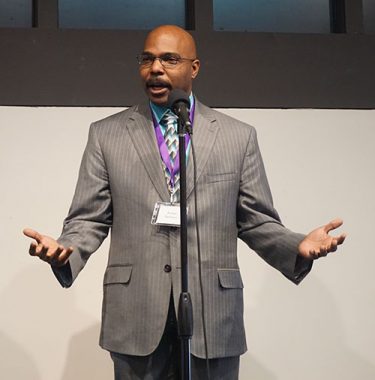Story and photos by Mark Heller
GCU News Bureau
Everyone has a story, and the ones that were told Saturday at The Newton in Phoenix served as a tasty appetizer to the main course that’s coming to Grand Canyon University.
More than 30 four-minute presentations, many of them highly personal, were delivered in the X-Trials, the audition for the TEDx event scheduled for March 2 at GCU Arena. A panel of students and faculty will choose the 20 finalists by Wednesday.

TED (Technology, Entertainment and Design) is a nonprofit that spreads concepts using short, powerful talks on a wide swath of topics, including science, business, sociology and global issues. In 2009, TED launched TEDx with the goal of bringing the TED experience to local communities, cities and universities.
Saturday’s auditions featured GCU students, faculty, business leaders, scientists, psychologists, former military personnel, filmmakers and many others from all walks of life.
Led by Colangelo College of Business instructor Paul Waterman as their faculty adviser, more than 60 GCU students have fueled the X-Trials and local TEDx initiative, including committees representing six colleges. The finalists will receive outside help and coaching for their five- to 20- minute presentations they will share in the full-day TEDx program.
Co-founder Jedidiah Woods, a junior at GCU, hopes it will be the largest TEDx event in Arizona history and include some TED Talk staff.
“It’s unbelievable what the students have done here,” Dr. Randy Gibb, the CCOB dean, said as he surveyed the crowded room during a brief intermission.
The rapid growth and success of TED Talks worldwide influenced Woods and co-founder Austin Mosher to seek support from fellow students, GCU’s Project Management Club and CCOB about bringing a (for now) independent TED Talk to GCU.

“Usually TEDx is done by business professionals, but rarely is it organized by and put together and done through students,” Woods said. “We’re giving people an opportunity to share their stories and reach a potentially worldwide audience, and students get an awesome opportunity to show leadership, organization and how to plan events. It’s a win-win-win.”
While waiting to learn who will be among the 20 finalists, speakers themselves found the GCU-fueled concept of expanding TED Talks to be a potential boon for anyone willing to share their stories, ideas, and perspectives on important issues nationally and globally.
“The hard part is keeping it to four minutes,” said Dr. Steven Hansen, president and CEO of the Arizona Humane Society, after he outlined how animal rescue organizations need to move away from the doom and gloom commonly associated with shelters.
“It’s getting the opportunity to hear others and how they think about ways we can change the world. I didn’t know what to expect, but it’s an honor to be asked to come here and share.”
Several stories were heartwarming.
Ron Blake, 47, was a sexual assault victim and suffered a series of PTSD-related trauma following his return to civilization from the military. He lost his business and said he was on the verge of suicide one night when something on “The Late Show with Stephen Colbert” made him laugh out loud.
An internal light flickered.
“Instead of looking for a miracle in the distance, I found something nearby to grab onto,” he said. “It could have been a pet or some food. I found in laughter there was hope.”
He carries two large poster boards everywhere he goes, filled with messages from those he has spoken to, and a few Sharpies in his pockets.

In the last year, he said, he finally has felt ready to work again, this time in sales.
“It’s about passing on the information that we all collect to everyone else,” he said of auditioning for TEDx and TED Talks. “It’s fun to share. This is the foundation we are as humans, the ability to communicate. It’s really cool to share that.”
Others stories were heart-wrenching. David Schneider has been a quadriplegic since birth yet is certified in scuba diving and owns his own website company. He shared a childhood story of an arduous process he went through one morning to open a pizza box left on the counter, only to eventually find a couple small pieces of leftover crust from the night before.
“I got a key to succeed in life,” he said of his speech on changing life perspectives. “I found ways to go around obstacles and conquer.”
Others offered alternative perspectives on issues within education, mental illness and PTSD, health care, conscious capitalism and more.
Stephen Parisi is a sophomore and Secondary Education major at GCU who explored ideas and ways that final exams in both high school and college are antiquated and unproductive. He believes projects, presentations or research papers are better means for student learning, and, for a teacher, more reliable and accurate in reflecting how well concepts, critical thinking and fostering ideas are being learned.

Following stints in the Air Force and working for the FBI, Romeo Farinacci is the program director for cybersecurity in the College of Science, Engineering and Technology at GCU. He spoke of technology’s role in the growth of Science, Technology, Engineering and Math (STEM) but also about misconceptions surrounding cybersecurity as its role rapidly increases in importance.
He said of bringing TEDx to GCU, “It’s a little bit of marketing for GCU, but it’s also educating and enlightening people, and that’s how we can try to change what we see, perceive and how we live.”
For 20 people, this golden opportunity will come their way March 2. For GCU, it’ll be the first in what supporters hope will be an annual feast of listening, learning and serving.
“The ‘TED’ name is a real gravitas. We have an opportunity to be a voice for the world,” Woods said. “Wouldn’t it be awesome to replay TED talks in classes at GCU?”
Contact Mark Heller at (602) 639-7516 or [email protected]





































































